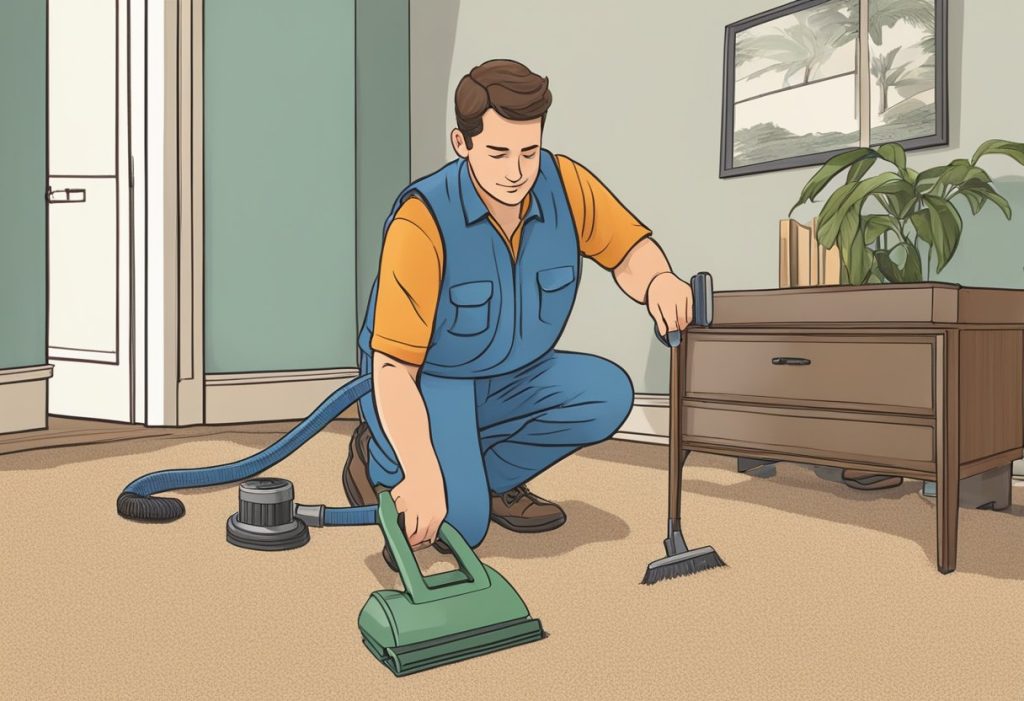Last Updated on March 18, 2024 by Kelvin Nielsen
If you’re a landlord in Florida, it’s important to understand the state’s laws regarding carpet replacement. Florida law requires landlords to maintain their rental properties in a habitable condition, which includes providing safe and sanitary flooring.
While there is no specific requirement for how often carpets must be replaced, landlords must ensure that they are free from hazards and in good condition.

As a tenant in Florida, you have the right to live in a rental property that is safe and habitable. This includes having flooring that is free from hazards and in good condition.
If you notice that your landlord has not replaced the carpet in your rental unit and it is causing health or safety concerns, you may be able to take legal action. It’s important to understand your rights as a tenant and the responsibilities of your landlord under Florida law.
Related Posts:
- Can a Landlord Enter Without Permission in Florida?
- Florida Landlord Tenant Law Utilities: What You Need to Know
- Florida Landlord Responsibilities: A Comprehensive Guide
Understanding Carpet Replacement Laws
If you are a landlord or tenant in Florida, it is important to understand the laws regarding carpet replacement in rental properties. Here are some key points to keep in mind.
Normal Wear and Tear vs. Damage
One of the most important things to understand is the difference between normal wear and tear and damage. Normal wear and tear is the expected deterioration of a carpet over time due to regular use. Damage, on the other hand, is any harm caused by the tenant that goes beyond normal wear and tear.
Landlord Responsibilities for Carpet Replacement
In Florida, landlords are responsible for maintaining their rental properties, including the carpets. According to Florida law, landlords must replace carpets that are worn out or damaged beyond normal wear and tear.
The useful lifespan of a rental-grade carpet is generally considered to be around seven years.
Tenant Rights and Security Deposits
Tenants have the right to a safe and habitable living environment. If a landlord fails to maintain the carpets in a rental property, tenants may be able to withhold rent or terminate their lease.
However, tenants should be aware that they may be held responsible for any damage to the carpets beyond normal wear and tear. Landlords may deduct the cost of carpet replacement from the tenant’s security deposit.
Lease Agreements and Carpet Clauses
Lease agreements should include a clause regarding the condition of the carpets at move-in and move-out. This clause should specify the tenant’s responsibility for maintaining the carpets and the landlord’s responsibility for replacing them when necessary.
Tenants should carefully review their lease agreement before signing to ensure they understand their responsibilities and rights regarding carpet replacement.
Related Posts:
- Free Legal Advice for Tenants in Florida: Know Your Rights!
- Florida Rental Laws Month to Month: What You Need to Know
Conclusion
In conclusion, understanding carpet replacement laws in Florida is crucial for both landlords and tenants. Landlords must maintain their rental properties and replace carpets when necessary, while tenants have the right to a safe and habitable living environment.
By having clear carpet clauses in lease agreements, both parties can avoid misunderstandings and disputes regarding carpet replacement.
Disclosure: The content herein isn’t a substitute for advice from a professional attorney. It’s only meant to serve educational purposes. If you have a specific question, kindly seek expert attorney services.
Sources: FL Statutes Chapter 83 Part II, Warranty of Habitability in Florida, Florida Landlord Responsibilities: A Comprehensive Guide

Amanda Rose is a seasoned landlord with 13+ years of expertise in overseeing diverse properties. Her adept management spans single and family homes, along with multi-family apartments and condos, across Wyoming and South Dakota. Her commitment and proficiency have cemented her status as a thriving property management professional.
She is a member of the following organizations: Wyoming Landlord’s Association, National Association of Residential Property Managers (NARPM), Wyoming Apartment Association, South Dakota Multi-Housing Association (SDMHA), and South Dakota Landlord Association (SDLA).







